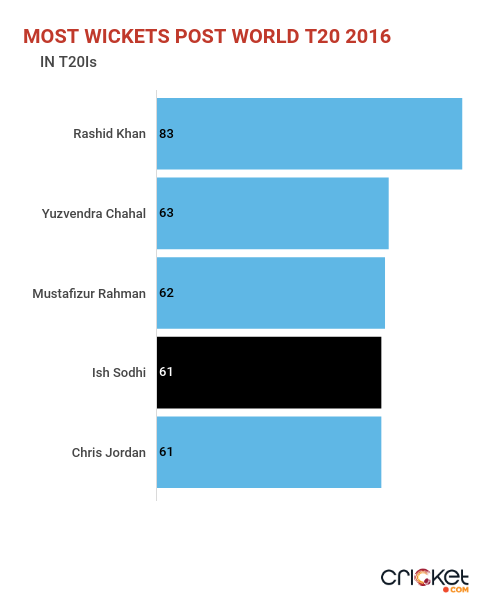 PRE MATCH ANALYSIS
PRE MATCH ANALYSISNew Zealand’s push for a place in the semi-final continues as they take on a Scotland side, who have lost both their matches in the Super 12 stage and are desperately in search of an elusive win in this stage of the competition. The Kane Williamson-led side brushed India aside with ease in their previous game and if they continue to perform the way they did, Scotland will not be too much of a hurdle either.
Scotland started off the tournament well, winning all three matches in the first round of the World Cup, but since then have succumbed to losses against Afghanistan and most recently against Namibia. Their task of registering their maiden win in Super 12 seems to getting tougher and tougher and New Zealand could not have come at a worse time.
Powerplay game
Unfortunately for Scotland, their batters in the first six overs have just not managed to deliver. In fact, among the teams in the Super 12, they have the worst balls per wicket (13.8) and runs per wicket (13.8) ratio, which surely has to improve. However, it will not be easy against the Blackcaps, whose bowling attack has been among the best this year.
Among the top 10 ranked sides, New Zealand have the best strike-rate (17.4) after Afghanistan (13.5) in the powerplay in T20Is in 2021.
In an exclusive interview with Cricket.com, Safyaan Sharif spoke about the need for the batsmen to not lose wickets in clusters like they have in the tournament. It is certainly going to be difficult against a team who operate with the likes of Tim Southee, Trent Boult and Mitchell Santner in the first six.
Their opening partnerships in the tournament read 0, 28, 33, 22 and 5, further implying that they have never really started off on the right foot with the bat.
What do Scotland have up their sleeve?
Speaking of Sharif, he is Scotland’s leading wicket-taker in T20Is, with 58 scalps to his name and along with Josh Davey is crucial to Scotland’s chances in this match. Sharif has an impressive record in T20Is in the UAE, picking up 31 wickets at 19.5 in the country. Davey, on the other hand, having been part of many World Cups for Scotland is a very important death bowler for them and has already made an impact in that stage, having picked up six wickets at an economy rate of just 6.7.
The consistency of Mark Watt will be important. He has been one of Scotland’s most consistent bowlers in the tournament. He may not pick up many wickets, but he manages to keep the runs down, further piling on the pressure on the batsmen. Watt has taken at least a wicket in five matches this tournament, only Wanindu Hasaranga has done so on more occasions (6) – doing so at a miserly economy rate of 5.50. He could be in for his biggest test against New Zealand.
Richie Berrington could be another bright prospect. The Scotland vice-captain has scored 373 runs at 53.28 in T20Is this year. Berrington is yet to get off the mark in the Super 12 stage, but will be key if Scotland are to get a significant total on the board.
Ish Sodhi - the biggest threat for Scotland?
Ish Sodhi sprung his web around the Indian batters the other night in Dubai. He has been among the most consistent bowlers in the world at the shortest format. In fact, only three other bowlers – Rashid khan (83), Yuzvendra Chahal (63) and Mustafizur Rahman (62) have picked up more wickets than Sodhi (61) since the end of the 2016 World T20. He has done so at a strike-rate of 16.5 and an average of 22.7.
 Barring George Munsey, all of Scotland’s top seven batsmen are right-handed. 17 out of Sodhi’s 21 T20I wickets this year have been right-handed batsmen, striking once every 8.2 deliveries. Needless to say, the Scots need to be wary of the leg-spinner.
Barring George Munsey, all of Scotland’s top seven batsmen are right-handed. 17 out of Sodhi’s 21 T20I wickets this year have been right-handed batsmen, striking once every 8.2 deliveries. Needless to say, the Scots need to be wary of the leg-spinner.
Any changes?
As far as Scotland are concerned, they will welcome their skipper Kyle Coetzer back into the side, if he has fully recovered from his finger injury. Craig Wallace will drop back to the bench. Barring that, it is just the question of Scotland executing their skills well against a dangerous New Zealand side.
Scotland likely XI: George Munsey, Matthew Cross (wk), Calum MacLeod, Kyle Coetzer (c), Richie Berrington, Michael Leask, Chris Greaves, Mark Watt, Josh Davey, Safyaan Sharif, Bradley Wheal.
New Zealand, on the other hand, would not want to tamper with a winning combination. They got in Adam Milne in place of Tim Seifert for the game against India and it paid off. It certainly did strengthen the bowling attack and at the same time did seem to weaken the batting line-up much.
The decision to have Daryl Mitchell open the batting his proved to be a good move for New Zealand. He averaged just 18 and struck at 131 when they used him as a finisher, but in his two innings at the top he has already accumulated 76 runs at 38 to go with a strike-rate of 138.
His opening partner Martin Guptill, on the other hand, is just 24 runs from becoming the second player after Virat Kohli to score 3,000 runs in men’s T20Is.
New Zealand likely XI: Martin Guptill, Daryl Mitchell, Kane Williamson (c), James Neesham, Devon Conway (wk), Glenn Phillips, Mitchell Santner, Adam Milne, Tim Southee, Ish Sodhi, Trent Boult